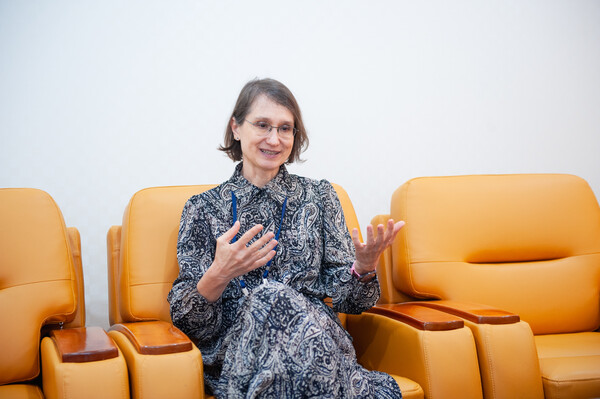Cancer is a global health challenge that affects millions of lives every year. To combat this disease and reduce its impact, the International Agency for Research on Cancer (IARC) conducts cutting-edge research, provides evidence-based recommendations, and fosters collaborations worldwide.
As an intergovernmental agency of the World Health Organization (WHO), the IARC has been at the forefront of cancer research for over five decades.

In an exclusive interview, Korea Biomedical Review spoke to Dr. Elisabete Weiderpass, director of the IARC, to hear her insights on the goals and objectives of the IARC, the direction of cancer control policy in the post-Covid-19 era, challenges faced by cancer research, and the importance of cancer prevention in low Human Development Index (HDI) countries.
Weiderpass visited the National Cancer Center in Goyang, Gyeonggi Province, on June 19 to attend the 15th NCC International Symposium, titled "Cancer Prevention: New Challenges and Solutions," where she gave a special lecture on IARC's mission in research on cancer prevention.
"The IARC focuses on conducting research to identify the causes of cancer, developing strategies for cancer prevention, providing scientific evidence to support cancer control policies and interventions, collaborating with international partners, and building capacity in cancer research and control through training and expertise," she said.
When asked about the direction of cancer control policy in the post-Covid-19 era, Weiderpass emphasized the importance of incorporating lessons learned from the pandemic and adapting to the evolving healthcare landscape.
She highlighted the need to strengthen healthcare systems, expand telemedicine and digital health solutions, promote the integration of cancer control services with other healthcare programs, maintain cancer services during crises, and foster research and innovation.
Regarding cancer research's key challenges, Weiderpass mentioned limited resources, keeping up with rapidly advancing technologies, addressing health disparities, identifying emerging cancer risk factors, and translating research into practice.
"To address these challenges, it is important to advocate for increased investment in cancer research, foster collaborations, promote capacity building, and support research translation efforts," she said.
She highlighted the IARC is also making every effort to establish and maintain strong partnerships with governments, research institutions, and organizations involved in cancer research and control.
"The IARC facilitates knowledge sharing through conferences and workshops, engages policymakers with evidence-based information, and collaborates with advocacy groups and NGOs to raise awareness and advocate for cancer prevention and control measures," she said.
Notable collaborations and partnerships include the Global Initiative for Cancer Registry Development (GICR), which involves collaboration with countries and organizations worldwide to support the development and improvement of cancer registries, and the International Cancer Genome Consortium (ICGC), in which the IARC participates to better understand cancer biology through global collaborative efforts, she added.
Address cancer problems in developing countries
During the interview, Weiderpass highlighted addressing disparities in cancer incidence and mortality between countries based on the Human Development Index (HDI) is most important.
The IARC director explained that factors such as socioeconomic status, limited access to healthcare services, and lifestyle and behavioral differences contribute to these disparities.
"Notably, it is very important for low HDI countries to establish a cancer prevention system," she said.
According to Weiderpass, for low HDI governments, it is essential to prevent cancer in that it can be cost-effective as prevention measures are generally more cost-effective than treating advanced-stage cancers.
"Therefore, investing in prevention can help reduce the burden on healthcare systems in resource-limited settings," she said. "Focusing on prevention also empowers individuals and communities to take control of their health, regardless of socioeconomic status."
Strengthening cancer prevention can also contribute to overall public health improvements, she added.
Weiderpass stressed that she believes effective strategies for strengthening cancer prevention in resource-limited countries are taking an integrated approach to addressing many cancer risk factors, such as tobacco use, unhealthy diets, and physical inactivity.
However, the IARC director stressed that this could not be done just with the efforts of the low HDI countries and requires the help of advanced countries.
"Low-resource countries can be supported and helped to implement sustainable cancer prevention programs through various means," she said. "We can provide them with technical assistance, including training healthcare professionals, establishing cancer registries, and implementing screening programs."
Providing funding support by mobilizing financial resources through international collaborations, partnerships, and grants to support the implementation of cancer prevention programs in low-resource settings can also help, she added.
Weiderpass concluded the interview by conveying a message to the international community.
She emphasized the increasing impact of cancer globally and the need for concerted global efforts to address this public health challenge.
"This can only be done through solidarity, which makes international collaboration, partnerships, and sharing of resources and knowledge to improve cancer prevention treatment and support for affected individuals and communities very important," Weiderpass said. "The governments globally also have to prioritize cancer control on national agendas, allocate sufficient resources, and develop evidence-based policies to combat the disease."

